Você já tentou abrir uma de suas postagens no WordPress e foi recebido por um erro 404? Às vezes, isso acontece quando estamos trabalhando em nossos próprios sites WordPress ou ajudando nossos usuários
Esse erro ocorre quando você consegue acessar a área de administração e o blog do WordPress, mas, ao tentar abrir uma postagem específica, recebe a mensagem “404 Not Found” (404 não encontrado).
Pode ser frustrante ver seu conteúdo aparentemente desaparecer, mas encontramos algumas soluções alternativas para corrigir esse problema. Neste guia completo, mostraremos a você como corrigir posts do WordPress que retornam erros 404.
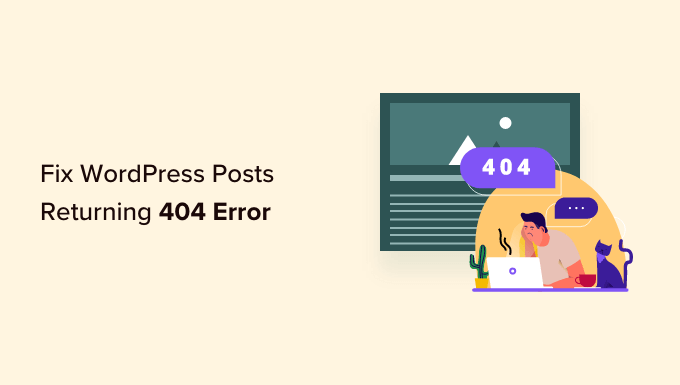
Por que meus posts do WordPress estão retornando um erro 404?
Há vários motivos pelos quais suas postagens podem estar mostrando um erro 404 “Página não encontrada” no WordPress. Esses motivos podem incluir:
- Conflitos de plugin ou tema: Às vezes, os plug-ins ou temas que você instalou em seu site podem interferir na forma como o WordPress lida com os permalinks. Isso pode levar a links quebrados e erros 404.
- Problemas de código personalizado: Se você adicionou código personalizado ao seu site, pode haver erros no código que estejam afetando os permalinks ou causando outros conflitos, resultando em erros 404 para suas postagens.
- Problemas com seu arquivo .htaccess: O arquivo .htaccess desempenha um papel importante na forma como o WordPress estrutura os URLs. Se esse arquivo estiver corrompido ou ausente, poderá resultar em erros 404 para seus posts ou páginas.
Como encontrar todos os posts do WordPress com erros 404
Antes de chegarmos às soluções, seria bom descobrir se esse erro está ocorrendo apenas em um ou dois posts ou em vários posts. Dessa forma, você poderá determinar o escopo do problema e escolher a solução mais adequada.
Uma maneira fácil de descobrir isso é usar o Google Search Console. Se você ainda não enviou seu site para o Google Search Console, leia nosso guia sobre como adicionar seu site WordPress ao Google Search Console.
Depois que o bot do Google rastrear e indexar o seu site, o Google Search Console fornecerá informações detalhadas sobre o desempenho do seu site, inclusive os erros 404 encontrados.
Para descobrir quais publicações estão retornando erros 404, faça login no painel do Search Console. Em seguida, navegue até o relatório “Páginas” e você verá uma lista detalhada de todos os erros.
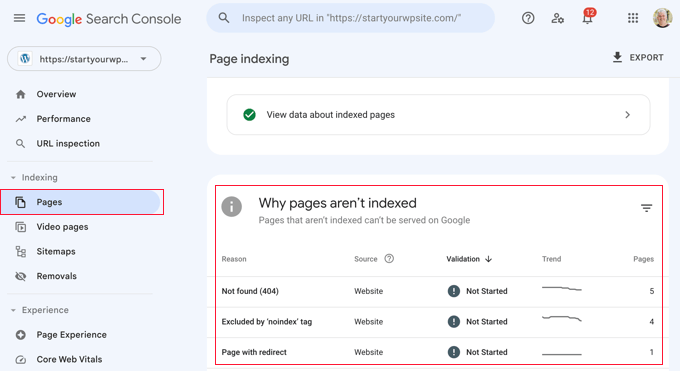
Para obter mais informações, leia nossa lista de dicas para usar o Google Search Console para aumentar o tráfego do site, que inclui algumas dicas sobre como corrigir erros 404 com a ferramenta.
Dito isso, vamos dar uma olhada em como corrigir posts do WordPress que retornam erros 404. Você pode usar os links abaixo para ir direto às diferentes soluções:
Não tem tempo para corrigir erros 404 por conta própria? O WPBeginner Pro Services pode ajudar! Com o nosso Suporte de Emergência para WordPress acessível, você pode contratar especialistas para corrigir erros 404, links quebrados, problemas de redirecionamento e muito mais. Pare de se estressar com os problemas do WordPress e resolva-os! Agende serviços de suporte emergencial para WordPress hoje mesmo!
Método 1: Verifique se há conflitos de plug-ins ou temas e problemas de código personalizado
Às vezes, plugins, temas ou códigos personalizados que você adicionou ao seu site WordPress podem interferir nos permalinks ou causar conflitos, levando a erros 404. Nós mesmos já passamos por isso quando testamos ferramentas em nosso site de demonstração.
Uma maneira de resolver esse problema é desativar temporariamente os plug-ins. Às vezes, os plug-ins podem atrapalhar a maneira como o WordPress lida com os links.
Depois de desativar os plug-ins, você pode reativá-los um a um e verificar se o erro 404 reaparece após a ativação de cada plug-in. Se o erro aparecer após a ativação de um plug-in específico, ele pode ser o culpado.
Em seguida, você pode fazer uma pesquisa rápida no Google para encontrar soluções relacionadas a esse plug-in ou entrar em contato com o desenvolvedor do plug-in para obter suporte.
Da mesma forma, seu tema do WordPress pode estar causando o conflito.
Para verificar, você pode mudar temporariamente para um tema padrão do WordPress, como Twenty Twenty-Three ou Twenty Twenty-Four. Tudo o que você precisa fazer é acessar Appearance “ Temas e clicar em “Ativar” em um tema padrão.

Se o erro 404 desaparecer com o tema padrão, isso indica um possível conflito com seu tema atual. Você pode tentar solucionar o problema com o tema ou considerar o uso de um tema diferente.
Você pode dar uma olhada em nossa seleção de especialistas dos temas mais populares do WordPress para obter recomendações.
Se você inseriu recentemente trechos de código em seu site, pode haver erros no código que estão causando os erros 404. Dê uma olhada no código que você adicionou e veja se consegue identificar algum erro.
A maneira mais segura de adicionar trechos de código ao WordPress é com o plug-in WPCode. Esse plug-in permite que você insira código personalizado sem trabalhar diretamente com os arquivos do tema, reduzindo o risco de danificar seu site.
Além disso, sempre que o WPCode detectar um erro no seu código, ele desativará automaticamente o snippet e solicitará que você o verifique. Você também pode usar o modo de teste para verificar se o código funciona antes de colocá-lo no site ativo.
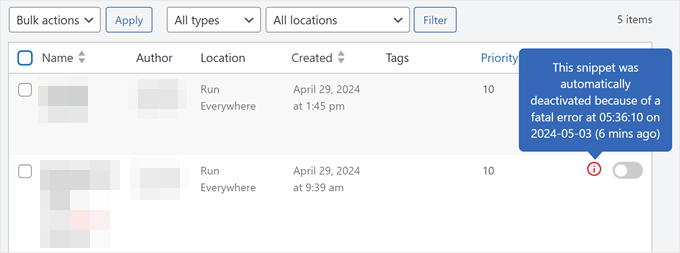
Se nenhuma dessas soluções funcionar, passe para o próximo método, no qual solucionaremos os problemas de suas configurações de permalink.
Método 2: Corrigir suas configurações de link permanente
Os posts do WordPress podem retornar erros 404 devido a problemas com regras de reescrita em seu arquivo .htaccess. Na maioria dos casos, você pode corrigir o problema atualizando suas configurações de permalink.
Basta acessar Configurações ” Permalinks em seu administrador do WordPress e clicar no botão “Salvar alterações”.
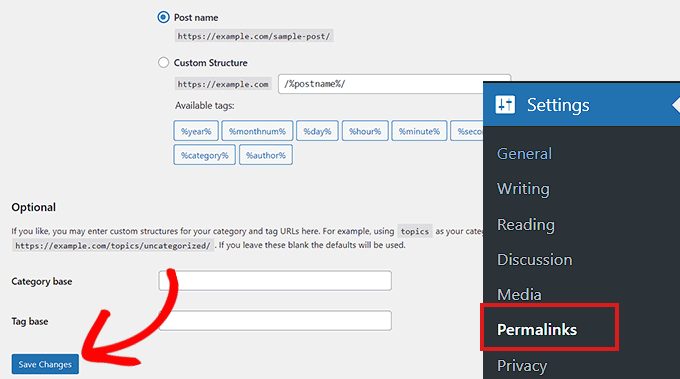
Não há necessidade de fazer alterações nas próprias configurações de permalink. Isso atualizará suas configurações de permalink e liberará as regras de reescrita.
Na maioria dos casos, essa solução corrige o erro 404 dos posts do WordPress. No entanto, se não funcionar para você, provavelmente precisará atualizar o arquivo .htaccess manualmente.
Método 3: Atualizar o arquivo .htaccess do WordPress
Antes de começar, certifique-se de fazer o backup do arquivo .htaccess do WordPress. Se algo der errado, você poderá restaurar facilmente o arquivo original.
Agora, você precisará se conectar ao seu servidor usando um cliente FTP como o FileZilla ou o aplicativo File Manager no painel de hospedagem do WordPress.
Em seguida, você precisará localizar e editar o arquivo .htaccess, que está localizado no mesmo local que pastas como /wp-content/ e /wp-includes/.
Basta clicar com o botão direito do mouse no arquivo e selecionar “File permissions” (Permissões de arquivo).
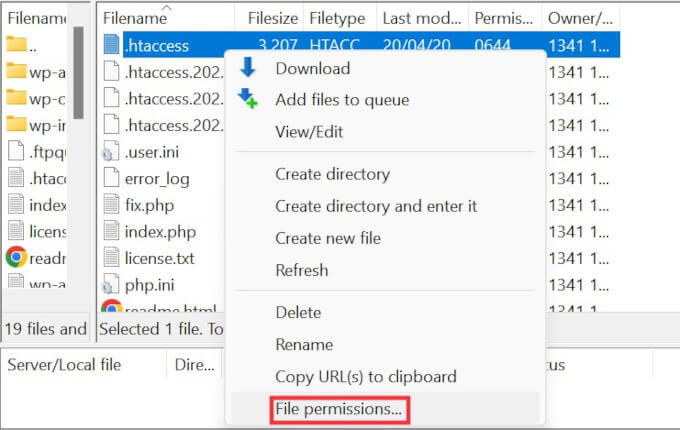
Você pode tornar o arquivo gravável alterando suas permissões para 666.
Basta digitar “666” na caixa “Valor numérico” e clicar em “OK”.
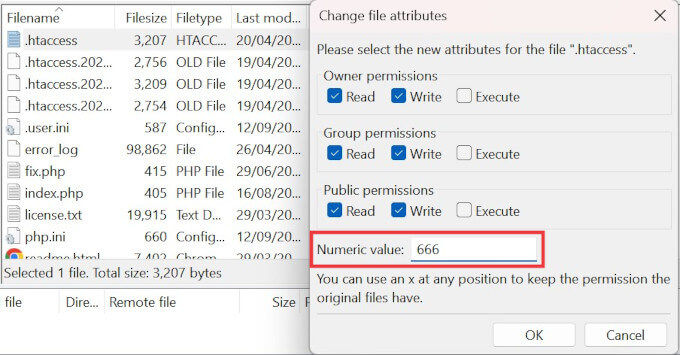
Em seguida, você precisa repetir as etapas do primeiro método do nosso tutorial. Depois de fazer isso, não se esqueça de alterar as permissões de volta para 660.
Você também pode editar o arquivo e adicionar código a ele.
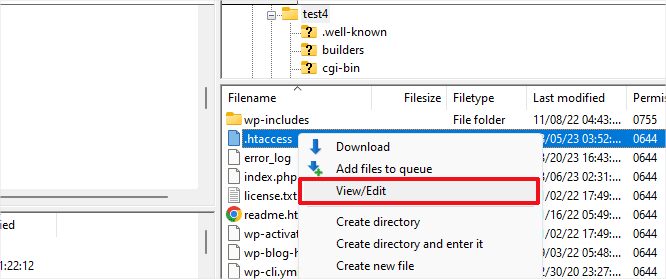
Depois de abrir o arquivo .htaccess com um editor de texto, basta inserir este código:
1 2 3 4 5 6 7 8 9 10 | # BEGIN WordPress<IfModule mod_rewrite.c>RewriteEngine OnRewriteBase /RewriteRule ^index\.php$ - [L]RewriteCond %{REQUEST_FILENAME} !-fRewriteCond %{REQUEST_FILENAME} !-dRewriteRule . /index.php [L]</IfModule># END WordPress |
Método 4: Entre em contato com o provedor de hospedagem
Se nenhuma das soluções acima tiver corrigido o erro de retorno 404 dos posts do WordPress, recomendamos entrar em contato com o provedor de hospedagem do WordPress. Pode haver um erro do lado deles ou eles podem ajudá-lo a solucionar o problema.
Consulte também nosso guia sobre como solicitar corretamente o suporte do WordPress e obtê-lo.
Método 5: Ativar mod-rewrite (instalação local do WordPress)
Se estiver usando um servidor local para fins de teste, será necessário ativar o mod_rewrite na configuração do Apache do seu site MAMP, WAMP ou XAMPP.
Isso permitirá que o WordPress gere URLs limpos e evite o erro 404 para posts e páginas em seu servidor local.
A forma de fazer isso varia de acordo com a plataforma que você usa. As pessoas que usam o XAMPP podem abrir o painel de controle e clicar no botão “Config” em Actions. Em seguida, selecione “Apache (httpd.conf)”.
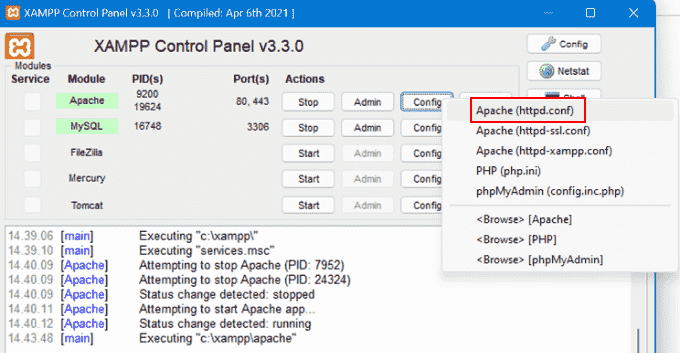
Em seguida, você precisará encontrar esta linha #LoadModule rewrite_module modules/mod_rewrite.so e remover o ‘#’ para descomentá-la.
Isso carregará o mod_rewrite.
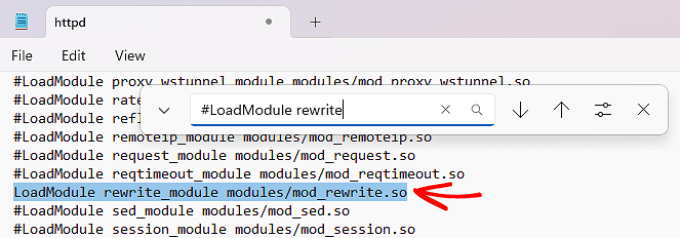
Em seguida, localize todas as instâncias de AllowOverride None e altere-as para AllowOverride All.
O valor “All” significa que todas as diretivas podem ser substituídas.
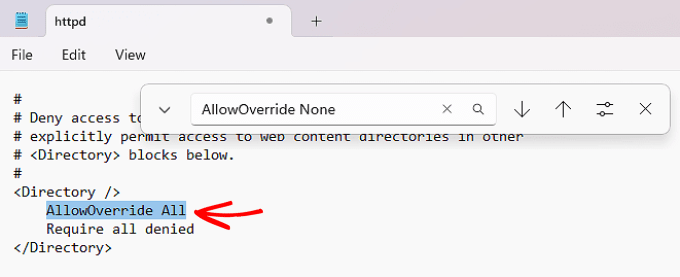
Uma vez concluído, você pode salvar o arquivo httpd.conf e fechá-lo. Depois disso, no painel de controle do XAMPP, clique em “Stop” (Parar) no módulo Apache e em “Start” (Iniciar) novamente para reiniciá-lo.
Em seguida, volte ao painel de administração para ver se os permalinks estão funcionando.
Tutorial em vídeo
Se você precisar de instruções visuais, basta assistir ao vídeo abaixo.
Esperamos que este artigo tenha ajudado você a solucionar os erros de mensagens que retornam 404 no WordPress. Talvez você também queira ver nosso guia sobre os erros mais comuns do WordPress e como corrigi-los, além de nossas escolhas de especialistas sobre os melhores plug-ins do WordPress para expandir seu site.
Se você gostou deste artigo, inscreva-se em nosso canal do YouTube para receber tutoriais em vídeo sobre o WordPress. Você também pode nos encontrar no Twitter e no Facebook.





Robert
Well, your tip saved me hours of searching – many thanks
Nima Arefi
Thank’s you saved my life :d
Juan
Hello, I have a problem since I migrate the website from localhost to a server, the main page looks good but the menu is not displayed but the links do not work always throws error 404.
They can help me, this is a cause of a migration from a local server.
Marissa
I can’t thank you enough for such a simple tutorial!! Everything else I found made it seem so difficult. I recently switched from http to https and it has been one problem after another..
WPBeginner Support
Hi Marissa,
Glad you found this tutorial helpful. Don’t forget to join us on Twitter for more WordPress tips and tutorials.
Admin
Rick
I didn’t have an .htaccess file so I created one with the info you provided above; then uploaded it and the site works perfectly again. Thanks!
Curtis
Hi I have done all the above and noticed the bit of text to copy and paste was already in there! It still is not working and im stressing out!
Tibi
I’ve done the same thing and nothing changed, the home page still not found
Please contact me if you find a solution
Patrick
Wow. This really saved my bacon. Thank you so much for the tip on simply saving the permalinks page. Incredible advice!
Alexis
hello! i’ve reset permalinks many times to deal with the 404 error. this time when i hit save a file downloaded to my computer: options-permalink.php and the site broke. just got a white screen and each time a file downloaded. finally i got the default permalinks to work but this is not a great solution. does this sound familiar to you? tech support didn’t think it was the .htaccess file but i’m not convinces. moved site from one host to another. any help would be much appreciated.
Mike Birdsall
How do I update settings if I can’t log into the WP admin. I get the 404 error when going to /wp-admin
Kelly
So helpful!! thank you!!!!!!
seun
Hello, please help, i seem not getting solution through this tutorial cos i can’
t access my dashboard, i keep getting this message any site directory i open.
Not Found
The requested URL /index.php was not found on this server.
Additionally, a 404 Not Found error was encountered while trying to use an ErrorDocument to handle the request.
Nukak
if you cannot access your dashboard. your issue is most likely a plugin issue. go to phpAdmin and disable all plugins.
this link might help you https://www.wpbeginner.com/plugins/how-to-deactivate-all-plugins-when-not-able-to-access-wp-admin/
once deactivated and you log back in you can then activiate the plugins that you need. all your initial settings before you got locked out of yur site would still remain in tact. all the best.
Clint
Thank you, just clicking save on my permalink page (which has been customised for years) worked immediately.
Chris Keeble
Perfect!
Clicking Save Changes on Settings > Permalinks works first time.
tamim
Wow! that’s a great solution.
Jason
Hi, I was having the 404 error problem. Homepage works fine, all other links have the 404 error. Tried the method you suggested in wordpress settings permalinks and click save changes but it didn’t work for me.
Saw some post earlier about sync the htaccess file through the webhosting settings page somewhere but don’t really know how to do it. Any advice? Thanks
Mohamad Zidani
Hi
I was using Fv Top Level Cats, when i removed still redirection worked from
example.com/category/tech to
example.com/tech.
i try your solution and it doesn’t work.
Joerg Naussed
the 404 appear right away what happen?
Tamara
That worked!! Thank you
Lijo Jose
Thank you, My problem was solved
Mariana Cervantes
Thank you so much!!!! My problem was fixed with the permalink solution
Michael
If this error is affecting your login page, go to .htaccess and remove:
“deny from all”
“allow from 00.00.00.00”
Matt Kay
Fantastic – I had moved my site from one server to another and started getting worried about 404 errors. The fix worked perfectly – so easy!
Bienvenido
A very simple answer to a hair pulling issue. Thanks a bunch. BTW this issue started after I installed BJ Lazy Loading.
Gail Gardner
Thank you! This did the trick.
Ahmed
Hi, One of my site was hacked. There was few hundreds article inserted. Now those has been removed. Google webmaster console showing those as 404.
How this can affect my site how to fix this?
Thanks
Stephanie
Wow, thank you! This worked perfectly.
Mawuli Tanor
Spot on! On the dot!
First fix worked.
Thanks a lot!
Peter Mazzi
Thanks. pity there’s no rating on this page. *****
David M. Curtis
Thank you for posting this article. I had spent months building a store / blog and today none of my pages or posts were working other than the front home page, all other links were taking me to a 404 error page. I was about to start completely over – re-peat months of work. This article saved my site. Now everything is working again. I can’t thank you enough.
WPBeginner Support
Hi David,
We are glad you found the article helpful Don’t forget to join us on Twitter for more WordPress tips and tutorials.
Don’t forget to join us on Twitter for more WordPress tips and tutorials.
Admin
Robin
Hi there, completely stuck here, not a computer guy at all so it’s all greek to me. my homepage is good but I’ve created another 5 pages such as blog post, services, etc. and every time I try to view the page I’ve just created I get NOT FOUND The requested URL /services/ was not found on this server.” I’ve tried saving changes didn’t make any difference and I have no idea what an FTP is. Any help ? thx
WPBeginner Support
Hey Robin,
Try updating your permalink structure. Simply visit Settings » Permalinks and then click on the save changes button without changing anything.
Admin
Preet Karan
Hi everyone,
i installed yoastseo plugin. i generated the XML site successfully, but when i tested it on google search console it is showing 404 error.
i tried the method listed in article but the problem still persist.
also i need to mention that in the CCpanel there are two files of the same name htaaccess and htaaccess.1 (with the same code written that has been mentioned by article above ); is it normal,
can you help me wth the issue
David
I can’t believe just clicking “Save Changes” worked. Thanks!
jorge
hello there im I would really appreciate help I followed the instructions on saving changes on permalinks not a computer person so do not know how to do the other after is showing me this
Fatal error: Class ‘Epsilon_Editor_Custom_Control’ not found
WPBeginner Support
Hi Jorge,
It looks like a plugin on your website is causing the error. You need to deactivate all plugins installed on your website, and then reactivate them one by one until you find the plugin causing the error. See our guide on how to deactivate all plugins when not able to access wp-admin for detailed instructions.
Admin
yugal joshi
great man..thank you much.. i open my site but its throwing 502 error then 503 error and then lastly 500 error..then i solve the problem of 500 from cpanel threw ur post.
but when i open my post pages its showed 404 error then i googled it and find ur post…thanks…
Bren
In the event this is a new server, or an Apache upgrade you may have to check the following:
Open the httpd.conf ie: /etc/httpd/conf/httpd.conf.
Change the AllowOverride None to AllowOverride All.
Save changes
Restart the Apache server.
Mariyam
Wow, as easy as that, Thank you!
Ashley Adams
Having a little trouble… After I hit save changes on the permalink page, another 404 error popped up.
Katherine
This just saved me hundreds of dollars in help. <3
James V
Quick fix…thanks for the help!
marco
still having problems, not sure what to do, i followed steps above, and get same results. my web host company uses windows 2012 server so no .htaccess file. so many of these help posts refer to .htaccess which windows does not use. they use the web.config file i think, is that correct? please help
marco
I have followed the above steps, but still does not work. I am on windows 2012 R12 server and do not have a .htaccess file, even while in FTP force hidden files to display . are there instructions on how to fix this problem when on windows server
WPBeginner Support
Hey Marco,
First you need to download a backup of your existing web.config file to your computer. After that you need to edit the file on your server and add following rule to the system.webServer element:
<?xml version="1.0"encoding="UTF-8"?><configuration><system.webServer><rewrite><rules><rule name="WordPress Rule"stopProcessing="true"><match url=".*"/><conditions><add input="{REQUEST_FILENAME}"matchType="IsFile"negate="true"/><add input="{REQUEST_FILENAME}"matchType="IsDirectory"negate="true"/></conditions><action type="Rewrite"url="index.php"/></rule></rules></rewrite></system.webServer></configuration>1-click Use in WordPress
Admin
Salami
Hi WPBeginner Support. I have tried all the solutions pasted on this blog to solve the same problem(404 error on wordpress) am confronting now since two days, but i haven’t got it right. Am developing my website with windows platform using wordpress. Please what other thing I should do to solve this problem?
Thanks in anticipation to your response.
Dale
Amazing help thank you! As simple as clicking save!
david c
worked like a charm – thank you thank you!
Tom
Many thanks,
Worked a treat!
Michelle
I want to hug you for all your extremely helpful posts. Thank you very much!!!
Steve Andrews
I migrated a site to, imported the mySQL DB and uploaded the entire file structure of the wordpress directory.
I still got a 404 error for everything but the home page, and re-saving the config in the permalinks section did not work.
What worked for me was renaming the htaccess file on the FTP site to htaccessOLD so it would not be referenced, but I still have it backed up if needed, then I went and saved the permalink options, had to chose what type of link I wanted (IE date, page no or description). Once I saved all the pages were back up and running.
Thanks for the post, it gave me the pointers to find this and fix it.
Rene
I followed the exact steps but unfortunately they don’t work for me. I keep getting errors 404 despite saving my permalink info, removing .htaccess and re-generating it. I am able to view my home page, but as soon as I want to visit a sub page, the error 404 pops up. I also tried switching to WPs default themes, also that doesn’t help. Are there any advices for “advanced” bug solving in case of 404 errors?
WPBeginner Support
Hey Rene,
Try updating WordPress URLs by visiting the Settings > General page. Make sure that your site and WordPress URL are the same.
Admin
sampurna
Hey. I have a little problem with 404. I had changed the permalink of a single post. now for a certain keyword google is displaying the same post in two different positions with same title but different url and one has 404 error. please help.
WPBeginner Support
Hi Sampurna,
You can setup a redirect for the URL returning 404 error. See our guide on how to setup redirects in WordPress.
Admin
Rene
Not needed, problem is fixed. I coincidentally found out that my host is reading a different .htaccess file than the one that WP generates. So a “sync” had to be done via their webhosting portal, that was all. Now it works, thanks a lot anyway and perhaps this alternative solution is still useful for other to know that may have a similar setup by their host. Rgds!
Carey
Same here! Needed to ‘sync’ the htaccess file through the webhosting settings page somewhere… thanks for the tip!
Rajinder S. Gill
This was quick. Thank you
Lois
You saved my life today. I was at the verge of crying because after creating a post, I was unable to read the post. it returned 404 error. I eearched several websites for answers but your post was well explicit and once I changed the permalink structure, it worked. Thank you thank you.
Kaylee
I’m still now following at where you exactly change the permissions at. Could you please explain?
Mike lavie
The solution: Login to your server using FTP, and modify the folders like /wp-content/ and /wp-includes/ are located. The easiest thing you can do is to temporarily make the file writeable by changing the permissions to 777. Then repeat the original solution.
Go to Settings » Permalinks, and simply click on Save Changes button.
Don’t forget to change the permissions back to 755 ( /wp-content/ and /wp-includes/ ).
I do it for is perfect now!
Lukas
Great, that help a lot!